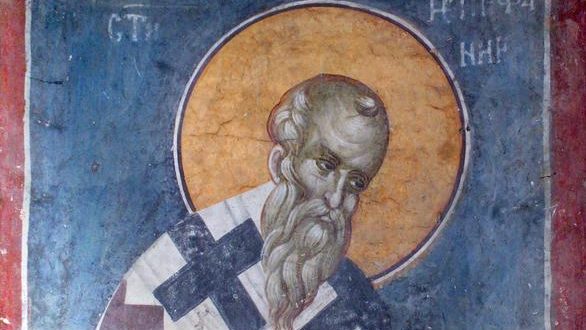St. Epiphanius was born in Palestine around the year 310. His parents were Jewish, but Epiphanius is said to have been drawn to the Catholic Church after seeing a monk give away his clothing to a homeless person.
Not long after his conversion, Epiphanius became a monk, living in the Egyptian deserts.
Around 333, Epiphanius returned to the Holy Land, and built a monastery near his birthplace in Judea. He upheld the rigors of monasticism, even though many other monks at the time considered them excessive, and insisted that he was working for God’s kingdom.
Epiphanius was versed in Hebrew, Egyptian, Syrian, Greek, and Latin languages and literature. For over 20 years, he was a disciple and close companion of St. Hilarion the Great, a monk known for his wisdom and the miracles he performed.
Even after Hilarion left Palestine around the year 356, he maintained a friendship with Epiphanius. Hilarion’s influence in the Church of Salamis, in present-day Cyprus, was a determining factor in Epiphanius’ election as bishop in 367.
In Palestine, Epiphanius offered frequent guidance in the Church’s struggle against Arianism, the heresy that denied Jesus’ eternal existence as God. As bishop, Epiphanius wrote many works arguing for orthodox teachings on subjects such as the Trinity and the Resurrection.
Epiphanius was a strong voice for orthodoxy, although his zeal was sometimes misguided or uninformed. He inadvertently became involved in a plot against St. John Chrysostom. Some of his apologetic works are also regarded as inaccurate or flawed today.
Despite this, Epiphanius is revered among the early Church Fathers, and his writings that contain important formulations of orthodox belief are cited in the Catechism of the Catholic Church.
Epiphanius died in 403, while returning from Constantinople after distancing himself from the attempts to depose St. John Chrysostom. When he sensed he was near death, Epiphanius gave his disciples two final pieces of advice: to keep God’s commandments, and to guard their thoughts against temptation.
Epiphanius was buried on May 12, after his ship’s return to Salamis. In 787, the Seventh Ecumenical Council confirmed his reputation as a Church Father.

